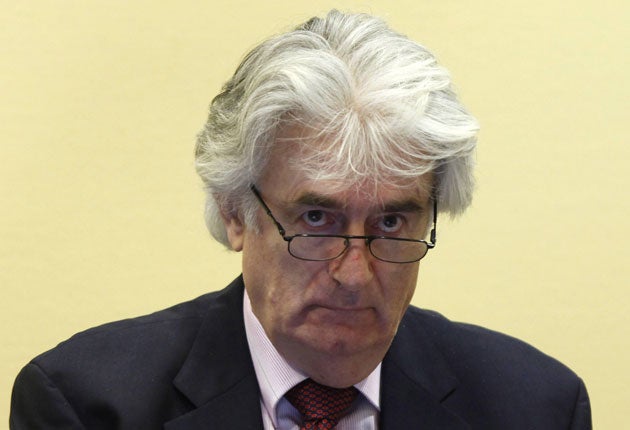Down the hall, Karadzic case slowly grinds on

Your support helps us to tell the story
From reproductive rights to climate change to Big Tech, The Independent is on the ground when the story is developing. Whether it's investigating the financials of Elon Musk's pro-Trump PAC or producing our latest documentary, 'The A Word', which shines a light on the American women fighting for reproductive rights, we know how important it is to parse out the facts from the messaging.
At such a critical moment in US history, we need reporters on the ground. Your donation allows us to keep sending journalists to speak to both sides of the story.
The Independent is trusted by Americans across the entire political spectrum. And unlike many other quality news outlets, we choose not to lock Americans out of our reporting and analysis with paywalls. We believe quality journalism should be available to everyone, paid for by those who can afford it.
Your support makes all the difference.As Ratko Mladic made his first appearance before the international criminal tribunal in The Hague's Courtroom One yesterday, his alleged accomplice Radovan Karadzic continued to defend himself against identical charges of genocide and crimes against humanity down the hall in Courtroom Three.
After 13 years on the run, the former Bosnian Serb political leader was arrested in Belgrade in 2008, heavily disguised with a ponytail, beard, and with a new career as a faith healer. But his subsequent trial before the International Criminal Tribunal for the former Yugoslavia (ICTY) has made little progress since it began on 26 October in 2009.
Unlike Mladic, Karadzic did not turn up to his first hearing. By arguing that he had not been given enough time to prepare his case, it is estimated that Karadzic has so far managed to delay his trial by two years. It is now scheduled to end in 2014. If Karadzic were to be tried with Mladic (as has been suggested by the ICTY prosecutor because they shared the same indictment) his trial proceeding would be further delayed.
Courtroom One, where Karadzic was being tried before Mladic arrived in The Hague, was the setting for the notorious trial of the former Yugoslav president Slobodan Milosevic, which lasted four years before his sudden, fatal heart attack in 2006.
In addition to Mladic and Karadzic, 12 other people are on trial before the ICTY, including Momcilo Perisic, the former chief of general staff of the Yugoslav army (previously the most senior Yugoslav army officer to be charged with war crimes). Sixteen others are currently appealing against jail sentences.
In the 18 years since the ICTY was established by the UN, 161 Serbs, Croats and Muslims have been indicted. Of those, 64 have been convicted, 13 acquitted, 13 transferred to Balkan states for trial and 36 have had their indictments withdrawn. One, the former Croatian Serb leader Goran Hadzic, is at large.
Join our commenting forum
Join thought-provoking conversations, follow other Independent readers and see their replies
Comments